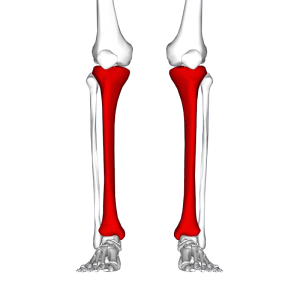Often refereed to as “shin splints,” this painful condition is actually not a specific injury, but rather a collective term that refers to several different injuries of the lower leg.
A common exercise-related ailment, injuries that fall under this umbrella term are typically the result of inflammation due to an injury of the soft tissues in the front of the outer leg (tibia). Shin splints have been known to occur most commonly in runners, but in reality any rigorous activity in which repetitive stress is placed on the shinbone can bring about this condition.
It is more likely for a person to incur shin splints when their leg muscles and tendons are tired or if the intensity of their workout is rapidly increased. Women, people with flat feet or rigid arches, athletes, military recruits, and dancers all have an increased likelihood of developing shin splints.
If you believe you are suffering from shin splints, then it’s more than likely that you have sustained one of these injuries:
Medial tibial stress syndrome: The most common cause of leg pain in athletes, medial tibial stress syndrom (MTSS) is an overuse injury in which the muscles of the lower leg pull on the periosteum or sheath surrounding the bone, causing pain on the inner aspect of the shins. This pain usually runs along the length of the shin and may be present in one or both legs.
Tibial stress fracture: A stress fracture of the tibia is an overuse injury that typically develops gradually over time due to activities placing large amounts of stress on the tibia. The pain is usually located directly over the bone in the shin and is relieved when not bearing weight. An X-ray, bone scan and CT scan are usually required to confirm this diagnosis and determine the severity of injury.
Anterior tibialis tendonitis: Patients suffering from tibialis anterior tendonitis usually experience pain at the front of the shin, ankle or foot during activities which place large amounts of stress on the tibialis anterior tendon. The pain is located along the outer border of the lower leg bone, where the anterior tibialis muscle is located, and can first become noticeable when walking or running uphill. Other symptoms include pain when bending the foot and toes up as well as swelling and redness over the front of the ankle where the tendon is.
If you are dealing with shin splints, it is important to stop running completely or decrease your training depending on the extent and duration of pain.
In most cases, shin splints can be treated with rest, ice and other self-care measures. This will give the tibia time it needs to recover from high levels of stress, thus reducing inflammation and pain levels. It is important to make a gradual return to activity after the pain has subsided in order to avoid re-aggravating the injury — a process that may take multiple weeks depending on the severity of the injury.
At Delray Beach Podiatry, Dr. Ian S. Goldbaum luckily has the tools to expedite this healing process, as the only podiatrist in South Florida currently using Erchonia’s FX 635 laser to treat soft-tissue disorders.
“Erchonia’s FX 635 laser is ideal for treating chronic heel pain sufferers and other soft-tissue disorders because it offers effective, pain-free treatment — without side effects,” Dr. Goldbaum said. “In just three weeks with two treatments per week, patients can have significant and lasting relief from these conditions.”
The FX 635 laser produces a low-level, or cold, output that has no thermal effect on the body’s tissue (you can’t even feel it!). FDA-approved for both efficacy and safety, FX 635’s low level laser technology works by stimulating a physiological response which accelerates healing.
In short, you just lie back, relax and let the laser do the rest. These treatments require no preparation and typically take 10-12 minutes. After only a few weeks, your pain can be gone or substantially reduced.
If you are interested in setting up a consultation with Dr. Goldbaum, please see our contact information below.
—
Follow Delray Beach Podiatry on Twitter @Delray_Podiatry
The content on this website is for informational purposes only. Do not rely or act upon information from www.DelrayBeachPodiatry.com without seeking professional medical advice. If you live in South Florida and would like a consultation with Dr. Ian Goldbaum, a podiatric physician and surgeon with over 30 years of experience, please see our contact information below:
BOCA/DELRAY
16244 S. Military Trail #290, Delray Beach, FL 33484
561-499-0033
BOYNTON BEACH
8198 Jog Road #100, Boynton Beach, FL 33472
561-499-0033


No responses yet